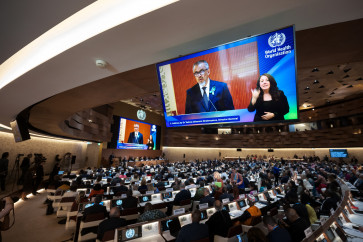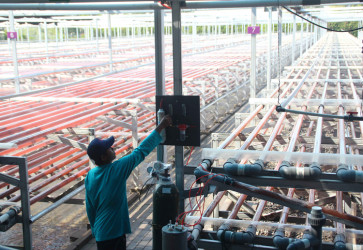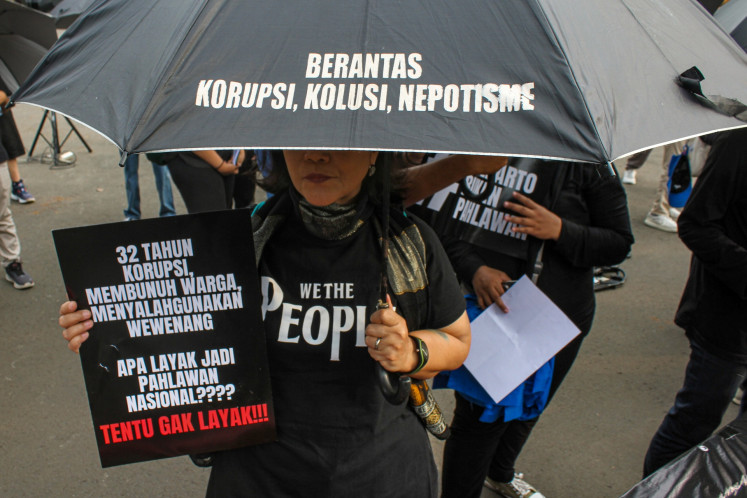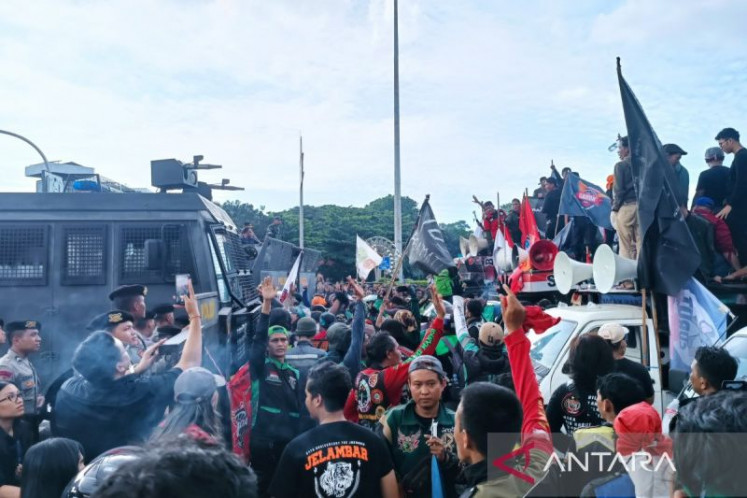LBH Bali: Committed to women and the poor
Running on a shoestring with three lawyers and fewer than 10 paralegal staff, the Legal Aid Foundation's Bali branch (LBH Bali) tackled about 90 cases during 2007
Change text size
Gift Premium Articles
to Anyone

Running on a shoestring with three lawyers and fewer than 10 paralegal staff, the Legal Aid Foundation's Bali branch (LBH Bali) tackled about 90 cases during 2007. Approximately half of those were domestic violence cases, and about a dozen cases went to court.
LBH Bali's vision is to provide protection, to uphold people's economic, social and cultural rights and basic human freedoms by providing free legal services to the poor.
At its office in Denpasar, director Agung Dwi Astika and Women and Children Division head Luh Gede Yastini -- both of whom have held their positions since 2006 -- explained about the foundation and their work.
Agung said that LBH Bali was formed in 1993 and became an official branch of the Indonesian Legal Aid Foundation (YLBHI) in October 1999. The YLBHI has 15 branch offices from Aceh to Papua, and is headed by executive director Patra M. Zen.
Agung noted that other legal aid organizations -- also known by the acronym LBH -- existed in Indonesia, but unaffiliated with the YLBHI.
LBH Bali takes on cases that fulfill one or more of their structural criteria: * An imbalance of power between the conflicting parties (often due to gender); * Cases brought by a poor person; and * A common problem, or one that affects many people (public dimension).
For cases that do not meet any of these criteria, LBH Bali staff will give brief advice and referrals.
If LBH Bali accepts a case, however, then they will compile a report and make an attempt at finding a solution or reconciliation, using mediation and introspection. Litigation is always the last resort.
Aside from the Women and Children Division, the other three divisions at LBH Bali are Labor, Human Rights, and Land, Environment and Natural Resources.
Most cases handled by the Women and Children Division involve domestic violence.
Indonesia's Domestic Violence Law (Law No. 23/2004) covers physical, sexual or psychological violence and neglect or abandonment within a household -- including domestic servants.
Under this law, rape is punishable by four to 15 years' imprisonment or a fine of Rp 12-300 million while sexual violence resulting in permanent injury, continual or recurring mental disturbance, miscarriage of pregnancy or malfunction of reproductive organs is punishable by five to 20 years imprisonment or a fine of Rp 25-500 million.
For all other domestic violence offenses, the law assigns maximum -- but not minimum -- sentences and fines.
Most often at LBH Bali, domestic violence cases are brought by a woman, and divorce is the objective. The victim may have suffered long-term abuse and has finally made the decision to seek legal assistance by coming to LBH.
Although domestic violence is a crime, these women often prefer to reach a divorce settlement than go to the police and have their husband -- the father of their children and breadwinner -- fined heavily or put in jail.
LBH Bali has helped many women receive a fair deal in divorce, something many Balinese do not realize is possible.
Under traditional Balinese law, or adat, divorce means that the ex-wife is returned to her birth family with nothing and that any children remain with the father and his family -- with visitation rights are often unrecognized.
Because of this, many women prefer to endure severe suffering in their marriage rather than risk losing everything and live forever with the stigma and shame of divorce.
However, under national law -- based on the legal tradition of the Netherlands -- in a divorce, the custody of children under 18 years of age is generally awarded to the mother, while the father may visit and is obliged to provide monetary support at a rate determined by a judge.
Divorce is also complicated with respect to another issue: polygamy. Although polygamy is allowed in Indonesia under certain circumstances -- and under Balinese custom, this is not uncommon -- national law stipulates that a husband who marries another wife without written permission from his existing wife (or wives) is committing a crime punishable by imprisonment.
A husband's taking a second wife often causes serious disharmony, so this law can assist the first wife in obtaining a fair divorce settlement, if desired.
LBH can assist women by mediation within families and with the traditional authorities in their communities, using litigation only if needed. Balinese women who embark on this legal process must understand the potential consequences of going against the local customs.
To illustrate, LBH Bali director Agung related the case of an Hindu-Balinese couple who legally adopted a Muslim child from a different district: They were thrown out of their village for going against the adat of adopting within their own religion, district, caste and clan.
The Women and Children Division also receives many cases of sexual abuse in which the perpetrator is often a family friend or neighbor. In such cases, LBH assists the victim or their family in filing a police report and following through with prosecution.
Since 2002, each branch office of the YLBHI has had to raise their own operational funds, receiving only a small monthly allotment of Rp 1.5 million from the central office to cover utilities.
Although LBH Bali had received some funding in recent years from the TIFA Foundation, currently they operate mainly on sporadic payments for specific projects as well as client "donations".
When asked about staff salaries, Agung laughed, saying he didn't remember the last time any of his staff were paid.
"We work at LBH Bali because of idealism and commitment," he said. "If people complain that they haven't been paid, well, they are free to find another job. This is a good place for learning and experience, for working on something you believe in."
Agung added that LBH Bali policy stipulates that no one may work there longer than seven years. Regarding the dearth of funding, he pointed to the frequent misperception among international donor agencies -- even those with offices in Bali -- that Bali had no need for donor money.
"Do you know that there are many people starving in Bali? It's true. People don't believe it," Agung said.
"There are so many poor people in Bali who need aid, including legal aid."
[box] For more information on projects and donations, contact:
Lembaga Bantuan Hukum (LBH) Bali Jl. Plawa No. 57 Denpasar, Bali 80233 Tel/Fax: (0361) 223010 lbhbali@indo.net.id









